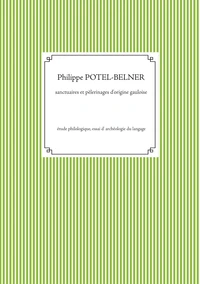Welsh Etymological Dictionary
Par :Formats :
- Paiement en ligne :
- Livraison à domicile ou en point Mondial Relay indisponible
- Retrait Click and Collect en magasin gratuit
- Nombre de pages288
- PrésentationBroché
- FormatGrand Format
- Poids0.421 kg
- Dimensions14,8 cm × 21,0 cm × 1,7 cm
- ISBN978-2-322-17965-7
- EAN9782322179657
- Date de parution15/01/2021
- CollectionLangue et histoire
- ÉditeurBooks on Demand
Résumé
This dictionary refers to current and obsolete Welsh. First of all, this dictionary refers to a former language, older than Sanskrit or old Persian : this is the former language, originating from a very former religion, born in northwest India around ten thousand years ago. I have called this language : the Vedic language, because its vocabulary and its mechanisms can be observed in the Rg-Veda. Briefly : this language is based on the division of the Universe in two parts : day and night.
Personally, I have studied this language mainly in Sanskrit, this is a sort of primitive sanskrit, nevertheless I have found help in the Gaulish and Welsh languages. Through this book, I show many origins and etymologies in French, old French, English, old English, German, Basque, and many other languages that I know fairly well. Sometimes, unfortunately rarely, I refer to Arabic, Chinese, Japanese or African languages.
The analysis of these languages, much closer than one says until now, will be another great phase for a better knowledge of the past.
Personally, I have studied this language mainly in Sanskrit, this is a sort of primitive sanskrit, nevertheless I have found help in the Gaulish and Welsh languages. Through this book, I show many origins and etymologies in French, old French, English, old English, German, Basque, and many other languages that I know fairly well. Sometimes, unfortunately rarely, I refer to Arabic, Chinese, Japanese or African languages.
The analysis of these languages, much closer than one says until now, will be another great phase for a better knowledge of the past.
This dictionary refers to current and obsolete Welsh. First of all, this dictionary refers to a former language, older than Sanskrit or old Persian : this is the former language, originating from a very former religion, born in northwest India around ten thousand years ago. I have called this language : the Vedic language, because its vocabulary and its mechanisms can be observed in the Rg-Veda. Briefly : this language is based on the division of the Universe in two parts : day and night.
Personally, I have studied this language mainly in Sanskrit, this is a sort of primitive sanskrit, nevertheless I have found help in the Gaulish and Welsh languages. Through this book, I show many origins and etymologies in French, old French, English, old English, German, Basque, and many other languages that I know fairly well. Sometimes, unfortunately rarely, I refer to Arabic, Chinese, Japanese or African languages.
The analysis of these languages, much closer than one says until now, will be another great phase for a better knowledge of the past.
Personally, I have studied this language mainly in Sanskrit, this is a sort of primitive sanskrit, nevertheless I have found help in the Gaulish and Welsh languages. Through this book, I show many origins and etymologies in French, old French, English, old English, German, Basque, and many other languages that I know fairly well. Sometimes, unfortunately rarely, I refer to Arabic, Chinese, Japanese or African languages.
The analysis of these languages, much closer than one says until now, will be another great phase for a better knowledge of the past.




















